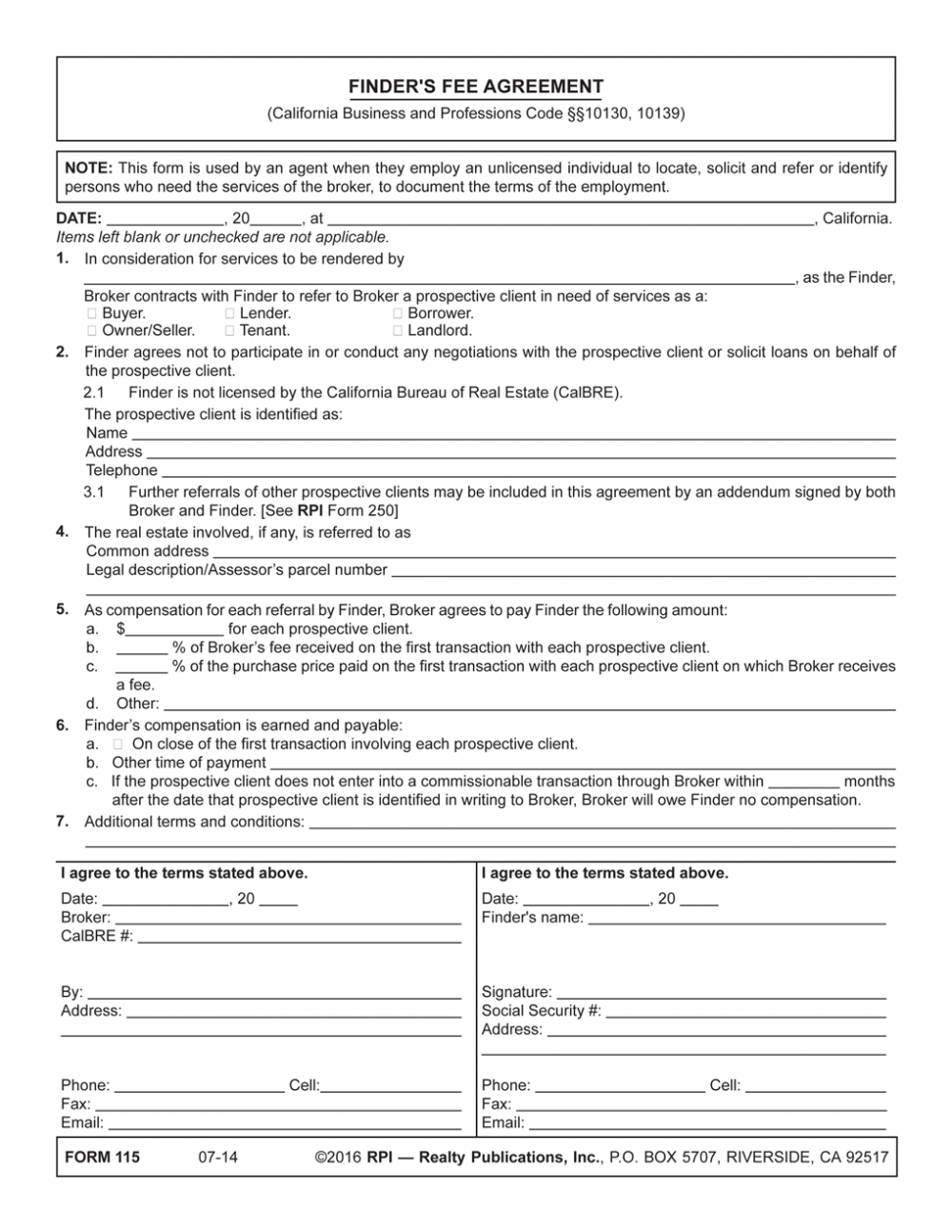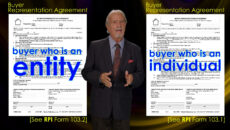Form-of-the-week:
Broker Referral and Finder’s Fee Agreements – Form 114 and 115
Beyond the agent’s scope of services
Brokers and their agents often encounter prospective clients who need brokerage services beyond those the agent can or is willing to provide. These situations are often about the location of property the client wants or an expertise outside the broker’s scope of practice — a common scenario experienced by all professions.
How agents best serve some clients is to refer them to another broker or agent known to them to be capable of providing the brokerage service the client needs. Thus, the agent making the referral properly asks for a fee from the brokerage office accepting the referral. The referral fee is earned when the client enters into a real estate transaction in which the other brokerage office is paid a fee.
Here, the referring agent needs to document the referral to ensure collection of the referral fee the other agent promises to pay. A referral fee agreement form is entered into as the best evidence of the arrangement. [See RPI Form 114]
Referrals may be made by brokers, agents or unlicensed finders.
Licensed brokers and sales agents owe fiduciary duties to the principals they represent. Fiduciary duties require brokers and their agents to perform on behalf of their client with the utmost care and diligence, as a protective shield in transactions.
Conversely, an unlicensed finder has no such fiduciary duty to members of the public. A finder’s function is limited to identifying and referring potential real estate participants to brokers, agents or principals in exchange for the promise of a fee. They are locators, period.
Limitations are placed on the conduct of a finder. A finder lacks legal authority to participate in any aspect of property information dissemination or other transactional negotiations. [Calif. Business and Professions Code §§10130 et seq.]
Although not licensed by the California Department of Real Estate (DRE) or accepted as members of any real estate trade association, finders are authorized by state codes to solicit prospective buyers, sellers, borrowers, lenders, tenants or landlords for referral to real estate brokers, agents or principals. Thus, they provide leads about individuals who may become participants in real estate transactions.
However, it is important to note the DRE enforces restrictions on finder activity. While California statute and case law permit employment of a finder to solicit clients on an ongoing basis, the DRE limits finder activity to occasional, nonrecurring referrals.
When an agent refers a prospective client to another agent, a referral fee agreement is used to document the referral. The referral fee agreement is designed as a broker-to-broker referral form. A referral is between brokers and is not to be confused with a finder’s fee agreement, as a finder is an unlicensed individual who locates clients for a broker and their agent. [See RPI Form 115]
An associate licensee, whether a sales agent or broker-associate, conducts their real estate activities by authority of their license, but always through their employing broker as called for in their Independent Contractor Employment Agreement. [Bus & P C §10137; see RPI Form 506]
The Broker Referral Fee Agreement published by RPI (Realty Publications, Inc.) is used by an agent when agreeing with another broker or their agent for their payment of a fee in exchange for the referral of a client who needs the services of the other broker. Further, the Broker Referral Fee Agreement is used to identify the person referred and document the amount and terms for payment of the referral fee. [See RPI Form 114]
The first section of the Broker Referral Fee Agreement identifies the agents involved in the referral as the Referring Broker and the Recipient Broker, as well as their Associate Licensees. It also designates the prospective client as either a:
- buyer;
- seller;
- tenant/lessee;
- landlord/lessor; or
- borrower. [See RPI Form 114]
The referring broker will receive no other fees on transactions the referred prospective client enters into through the services of the other broker. Further, the referring broker and their agents undertake no activities after making the referral that create a fiduciary duty owed to the prospective client. Their involvement is limited to the referral of the prospective client only. Accordingly, a provision in the referral fee agreement states the referring broker will not advise or participate in any negotiations with the prospective client.
The remaining sections of the form provide for:
- the identity of the prospective client;
- a description of the real estate involved, if applicable;
- the compensation to the referring broker;
- the conditions under which the referral fee is earned by the referring broker; and
- a mediation provision. [See RPI Form 114]
Although an oral agreement between brokers for a referral is fully enforceable, a documented agreement clearly sets:
- the agreed conditions for the fee to be earned;
- the amount to be paid; and
- when the fee will be paid.
Thus, the written Broker Referral Fee Agreement serves as evidence of the terms agreed to for payment of the referral fee earned, which otherwise might not be fully clarified in an oral agreement, or worse, later forgotten.
Similarly, a finder providing referral services in California for a fee may:
- find and introduce parties;
- solicit parties for referral to others [Tyrone Kelley (1973) 9 C3d 1]; and
- provide referrals to principals or brokers.
However, a finder may not:
- take part in any negotiations [Bus & P C §10131(a)];
- discuss the price;
- discuss the property; or
- discuss the terms or conditions of the transaction. [Spielberg Granz (1960) 185 CA2d 283]
A finder who crosses into any aspect of negotiation which leads to the creation of a real estate transaction needs a real estate license as they are both soliciting and negotiating. Unless licensed, an individual who enters into negotiations (supplying property or sales information) may not collect a fee for services rendered, even if they call it a finder’s fee. Also, the finder is subject to a penalty of up to $20,000 and a six-month jail term for engaging in brokerage activities without a license. [Bus & P C §§10137, 10139]
In addition, a broker who, directly or through their agents, permits a finder or anyone in their employ to perform any type of “licensed” work beyond solicitation for a referral may have their license suspended or revoked. [Bus & P C §§10131, 10137]
Brokers provide referral fees to finders under written contracts.
Written contracts are entered into to delineate the responsibilities each has undertaken and the scope of the services provided. Provisions limit their conduct to what regulations allow for their licensed or unlicensed status. [See RPI Form 115, 505, 506 and 510]
Finders generate business for the broker and their agent and thus are paid for that activity. However, the finder is always limited to locating new clientele for the broker or their agents.
Anyone may be a paid finder, unless barred by professional regulations, codes of ethics or conflict-of-interest policies controlling an individual’s conduct.
For instance, a licensed agent registered with the DRE as an employee of a broker may not directly act as a finder for a principal or another broker or that broker’s agents. The agent is employed to solicit clients on behalf of their broker, not others. In turn, their broker, not the agent, receives a fee generated by the agent’s real estate licensed activities. On the employing broker’s receipt of a fee (generated by the efforts of their agent), the fee is split with the agent under their written employment agreement. [Bus & P C §10132; Calif. Department of Real Estate Regulations §2726]
A finder who provides leads to a broker or principal may not hold themselves out as also rendering services which require a broker license. [Bus & P C §10139]
A finder is entitled to a fee as an unlicensed individual if the finder solicits, locates, places, introduces or delivers names of prospective clients to a broker or principal. [Tyrone, supra]
A finder’s fee agreement entered into between a finder and a principal regarding the finder’s referral services must be evidenced in a writing signed by the principal who employed the finder. If not, the finder may not enforce their fee agreement with the principal. [Calif. Civil Code §1624(a)(4)]
However, when a principal benefits from a finder’s referral under an oral finder’s fee agreement, such as closing a sale with an individual referred by the finder, the principal’s benefit will substitute for a written agreement. [Tenzer v. Superscope, Inc. (1985) 39 C3d 18]
Conversely, oral fee agreements between a broker (or their agents) and a finder are enforceable. No written agreement is required between a broker (or their agents) and a finder. However, as a matter of prudent practice, a writing memorializes the agreement as documentation against memories to the contrary, and is in conformance with DRE regulations. [Grant v. Marinell (1980) 112 CA3d 617; see RPI Form 115]
The Finder’s Fee Agreement published by RPI documents an agent’s use of a finder to locate, solicit and refer or identify persons who need the services of the broker. [See RPI Form 115]
The Finder’s Fee Agreement provides for:
- the identity of the prospective client;
- a description of the real estate involved, if applicable;
- the compensation due to the finder; and
- the conditions under which the referral fee is earned by the finder. [See RPI Form 115]
Though referral fees to finders are permitted under California law, they are prohibited in certain transactions by the federal Real Estate Settlement Procedures Act (RESPA).
No person in a RESPA-controlled transaction may give or accept a referral fee, kickback or any other thing of value for advising a homebuyer, seller or owner participating in the transaction to employ a particular service provider. The act of referring is not a service and no service provider, such as a transaction agent, may collect a fee for such a referral.
Thus, whether a Finder’s Fee Agreement can be used lawfully under federal law is dependent on the transaction. Referral fees are prohibited in transactions involving federally-related loans, as specified by RESPA.
A person is not involved in a RESPA transaction when negotiating the sale, lease or encumbrance of any of the following types of properties:
- apartment buildings with five or more units;
- commercial buildings;
- agricultural properties;
- business opportunities;
- vacant land (other than those involving one-to-four unit residential construction loans);
- properties containing 25 or more acres;
- leases and rental agreements;
- all-cash transactions; and
- seller carryback transactions where no federally-related loan is originated. [12 United States Code §2606(a)(1); 12 Code of Federal Regulations §1024.5(b)]
















